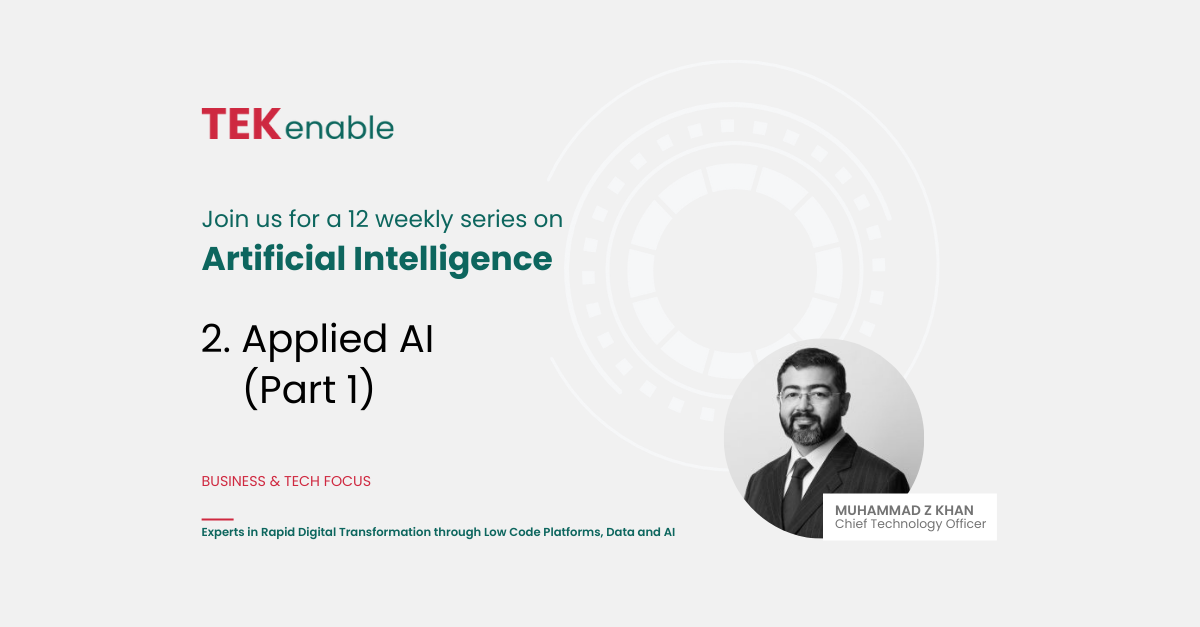Artificial intelligence is driving rapid change in how organisations do business but it’s integration into operations can be daunting. TEKenable’s Mohammad Z Khan, CTO Microsoft Services Division looks at how businesses can improve and augment their processes with Microsoft’s Azure Applied AI Services.
No one can fail to notice that artificial intelligence (AI) has set the world alight in 2023. However, looking beyond the excitement of chatbots, AI is rapidly building business use cases and is already creating value by rationalising processes and performing tasks that previously had to be done manually.
From customer service to fraud detection, and from document processing to supply chain management, there is barely an aspect of business today that cannot be streamlined, improved or augmented with the use of AI tools.
In this post, I will discuss how Azure Applied AI Services can benefit any organisation – and how you can leverage these cloud-based tools, creating a positive impact not only in terms of efficiency but, ultimately, on the bottom line.
Intelligence in the cloud
Azure Applied AI Services is a suite of cloud-based artificial intelligence (AI) and machine learning (ML) tools and services offered as part of Microsoft’s Azure cloud computing platform. It enables developers to easily build and deploy applications without requiring expertise in AI or ML, by bringing together Azure Cognitive Services, task-specific AI, and business logic to offer turnkey AI services for common business processes.
In effect, Azure Applied AI Services is a suite of pre-built AI models that can be easily integrated into business processes. These models are designed to solve common business problems such as document processing, customer service, anomaly detection, and content extraction.


Benefits of Azure Applied AI Services
Of course, with any technology there needs to be a business case for its adoption, and AI is no different. Azure Applied AI Services offers several benefits for organisations seeking to modernise their business processes:
- Accelerated development:
With Azure Applied AI Services, you can deploy AI solutions quickly without requiring machine learning expertise. This means that you can modernise your business processes faster and generate tangible value for your organisation in days rather than months. - Task-specific AI:
Azure Applied AI Services offers task-specific AI models that are designed to solve common scenarios such as document processing, customer service, and content extraction. This means that you can leverage these models to automate your business processes and improve efficiency. - Built-in business logic:
Azure Applied AI Services includes built-in business logic that can be used to solve common business problems. This means that you don’t need to spend time developing custom solutions for your organisation. - Extendable:
You can extend Azure Applied AI Services by using your own AI models from Azure Machine Learning. This means that you can customise the suite to meet the specific needs of your organisation.
How Azure Applied AI Services Can Benefit Your Organisation

Azure Applied AI Services can benefit your organisation in several ways, notably by helping you make sense of corporate data and, therefore, unlocking knowledge that can be used to create tangible value.
However, potential applications for AI go far beyond this, including machine vision and predictive maintenance. Whether your goal is to improve the customer experience or modernise internal processes, AI, by its very nature, is ideal for turning information into action.
1. Knowledge Mining:
Organisations can use the power of the Large Language Models in Azure OpenAI Service to create ChatGPT-like experiences over their own data using the Retrieval Augmented Generation pattern. It uses Azure OpenAI Service to access the ChatGPT model, and Azure Cognitive Search for data indexing and retrieval.


This technique allows organisations to quickly unlock knowledge from unstructured content. This is especially important as much organisational or corporate data is lost and effectively dead, locked up in systems or documentation and therefore not available to users. Indeed, according to some assessments 70% to 80% of organisational knowledge is locked in documents and e-mails rather than held in a structured form in an enterprise resource planning (ERP) or customer relationship management (CRM) system.
2. Automate document processing:
No one likes paperwork. Here again, AI can help. With Azure Form Recognizer, you can automate document processing tasks such as invoice processing, receipt processing, and form processing. This has a dramatic effect on productivity and information oversight by reducing manual data entry and improving efficiency across a wide range of processes.

I will return to cover the use of Form Recogniser in greater detail in a future post in this series.
3. Improve customer service:
With Azure Bot Service, you can build intelligent chatbots that can handle customer inquiries and provide personalised recommendations to customers. The end result is reduced response time and, therefore, heightened customer satisfaction.
With the introduction of Azure OpenAI services organisations can integrate ‘large language models’ like GPT4, the technology behind ChatGPT and Bing AI, into their bots. These powerful ‘LLM’ AIs add a lot of flexibility to the bot when it comes to understanding and processing natural language interactions or answering queries from reference content, thus reducing the need to script the chat interactions in advance. The end result is an improved customer experience (CX) due to the offering of a more natural flow of conversations and responses.

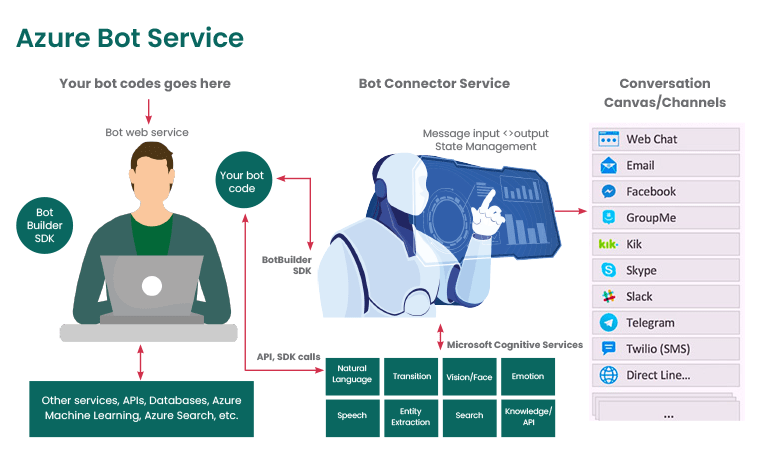
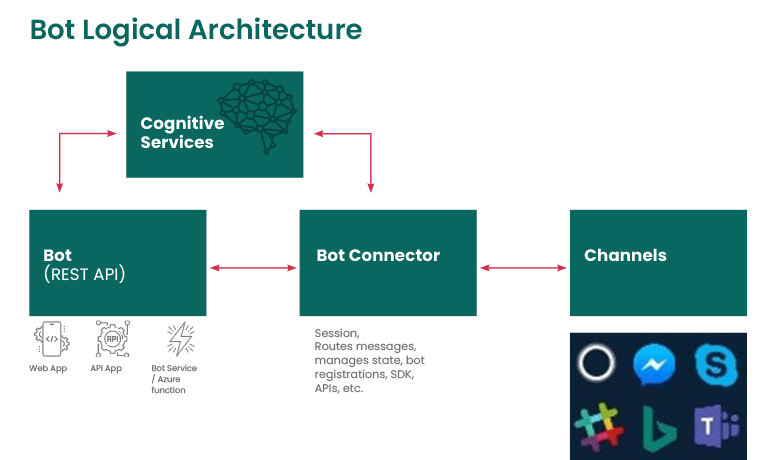
4. Understand the root cause of anomalies:
With Azure Metrics Advisor, you can proactively monitor metrics and diagnose issues before they become problems. This means that you can identify the root cause of anomalies and take corrective action before they impact your business.
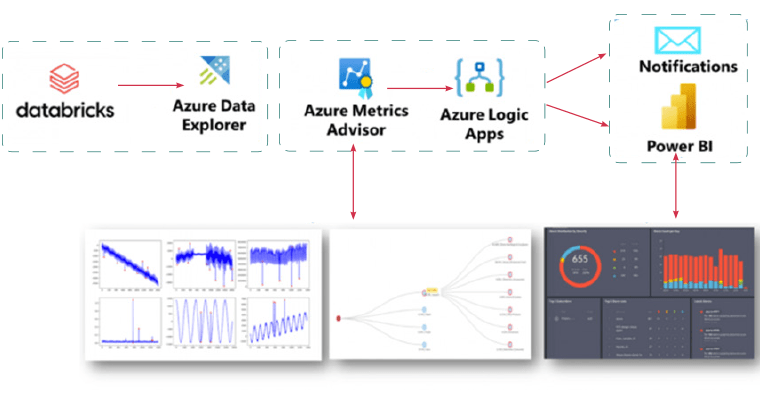
5. Extract insights from any content:
With Azure Cognitive Search, you can bring AI-powered cloud search to your mobile and web apps. This means that you can extract insights from any content and make informed decisions based on data.


6. Automate data labelling:
With Azure Machine Learning Studio, you can automate data labelling tasks such as image classification, object detection, and text classification. This means that you can reduce the time required for manual data labelling tasks and improve accuracy.
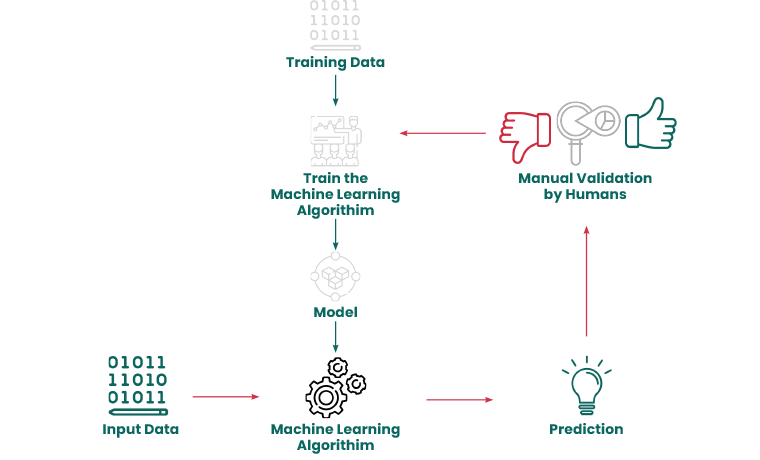
7. Improve inventory management:
With Azure Custom Vision, you can build custom image recognition models to identify products in images. This means that you can improve inventory management by automating product identification tasks.

8. Optimize supply chain management: With Azure Anomaly Detector, you can detect anomalies in time-series data such as sensor data or log files. This means that you can optimise supply chain management by identifying issues before they become problems.

9. Improve fraud detection:
With Azure Fraud Protection, you can detect fraudulent transactions in real time using machine learning algorithms. This means that you can reduce financial losses due to fraudulent activities.

10. Sentiment analysis:
With Azure Text Analytics, you can analyse customer feedback and sentiment to improve customer satisfaction. This means that you can identify areas for improvement and take corrective action to improve customer experience.
11. Personalised recommendations:
With Azure Personalizer, you can build personalised recommendation systems that can recommend products or services to customers based on their preferences, resulting in improved customer satisfaction and increased sales.
12. Predictive maintenance:
With Azure Machine Learning, you can build predictive maintenance models that can predict equipment failures before they occur. This results in reduced downtime and lower maintenance costs.
13. Speech transcription:
With Azure Speech Services, you can transcribe audio files into text. This means that you can automate transcription tasks and improve efficiency.
14. Language translation:
With Azure Translator, you can translate text from one language to another, allowing you to communicate with customers who speak different languages and, thus, expand your global reach.
15. Content moderation:
With Azure Content Moderator, you can automatically moderate user-generated content such as text, images, and videos. This means that you can ensure that your content is appropriate for all audiences and reduce the risk of negative publicity.
These are just a few examples of how Azure Applied AI Services can be used to modernize your business processes and improve efficiency.
Best practices for using Azure Applied AI Services
Understanding that AI can create value for a business or organisation is one thing. After all, the use cases above point to significant improvements in operational efficiency. However, it is important that AI is deployed in a rational manner that supports organisational objectives and meets external demands, whether from customers or the law.
Here are some best practices for using Azure Applied AI Services in a business context:
1. Define clear objectives:
Before implementing Azure Applied AI Services, it’s important to define clear objectives and identify the business processes that can be automated or improved using these services. This will help you determine which services to use and how to integrate them into your existing workflows.
2. Start small:
It’s a good idea to start with a small pilot project to test the effectiveness of Azure Applied AI Services before scaling up. This will help you identify any issues or challenges and make adjustments as needed.
3. Ensure data quality:
Azure Applied AI Services rely on high-quality data to deliver accurate results. It’s important to ensure that your data is clean, consistent, and up-to-date before using these services.
4. Ensure compliance:
When using Azure Applied AI Services, it’s important to ensure compliance with relevant regulations and standards such as the new EU AI Act, GDPR, HIPAA, and PCI DSS. You should also ensure that your data is secure and protected from unauthorized access.
5. Train your staff:
To get the most out of Azure Applied AI Services, it’s important to train your staff on how to use these services effectively. This will help them understand how these services work and how they can be integrated into your existing workflows.
6. Monitor performance:
It’s important to monitor the performance of Azure Applied AI Services regularly to ensure that they are delivering the expected results. You should also track key performance indicators (KPIs) such as accuracy, efficiency, and customer satisfaction.
7. Stay up-to-date:
Azure Applied AI Services are constantly evolving, so it’s important to stay up-to-date with the latest developments and best practices. You should also be prepared to adapt your workflows as needed to take advantage of new features and capabilities.
By following these best practices, organisations can ensure that they get the most out of Azure Applied AI Services and use it to achieve crucial business objectives while minimising exposure to risk.
Conclusion: Intelligent automation
Azure Applied AI Services is a suite of pre-built AI models that can be easily integrated into your business processes. It offers several benefits for organisations seeking to modernise their business processes including accelerated development, task-specific AI, built-in business logic, extendibility, automated data labelling, improved inventory management, optimized supply chain management, and improved fraud detection.
By leveraging these services, you can automate document processing, improve customer service, understand the root cause of anomalies, extract insights from any content, automate data labelling tasks, improve inventory management by automating product identification tasks, optimize supply chain management by identifying issues before they become problems, and reduce financial losses due to fraudulent activities.
Sources and further reading:
- Azure Applied AI Services | Microsoft Azure. https://azure.microsoft.com/en-au/products/applied-ai-services/.
- Microsoft AI Learn series: Advantages of AI for business leaders …. https://azure.microsoft.com/en-us/blog/ai-for-business-leaders-discover-ai-advantages-in-this-microsoft-ai-learn-series/.
- AI Customer Success Stories | Microsoft AI. https://www.microsoft.com/en-us/AI/customer-stories.
